Text
The Future of Vapor Degreasing In Cleaning Solutions | Chemtex Vapor Degreasing Chemical ( Alstaclean VD30 )
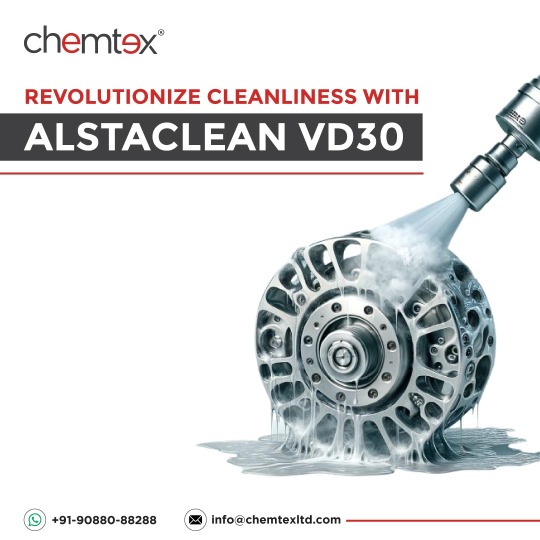
Alstaclean VD30 is a state-of-the-art vapor degreasing solvent designed for high-performance cleaning in various industrial applications. Its formulation is tailored to effectively remove oils, greases, and other contaminants from metal parts, ensuring a pristine finish essential for high-quality manufacturing processes. The innovation by Chemtex Speciality Ltd marries high efficiency with stringent safety standards.
#vapordegreaser#solvent degreaser#industrialdegreaser#enginedegreaser#degreasingchemical#heavydutydegreasing#industrialcleaning#removegreasestain#cleaningproduct#stainremoval#metalsurface#chemtex#alstaclean#VD30
0 notes
Text
The Benefits of Using Alstasan Silvox Agro for Soil Treatment | Chemtex Speciality Limited

Say goodbye to soil-borne diseases and hello to healthier crops! With its cutting-edge technology and eco-friendly approach, Alstasan Silvox Agro boosts soil fertility, enhances crop resilience, and maximizes your yields. Join the revolution in agriculture today!
#ecofriendlyfarming#greenagrorevolution#soilsavior#sustainablesoilsolution#agroinnovation#agrodisinfectant#cropprotection#silvox#soilhealth#silverhydrogenperoxide#chemtex
1 note
·
View note
Text
The Role of Descaling Chemicals in Enhancing Industrial Efficiency | Chemtex Speciality Limited

What is Scale?
Scale in the context of industrial machinery and water systems refers to the buildup of mineral deposits that can form on surfaces when water evaporates. These deposits often consist of calcium carbonate, magnesium, iron, and other minerals found in hard water. Scale buildup can occur in boilers, cooling towers, pipes, and any equipment that regularly comes into contact with water.
The presence of scale can significantly reduce the efficiency of machinery. It acts as an insulator, hindering heat transfer in systems designed to heat or cool, leading to increased energy consumption and higher operating costs. Furthermore, scale can cause blockages and corrosion, leading to equipment damage, reduced lifespan, and the need for more frequent maintenance or replacements. Removing scale buildup is therefore crucial for maintaining the efficiency, longevity, and reliability of industrial equipment, which is why descaling chemicals and processes are so important in industrial maintenance.
• Calcium Sulfate Scales, commonly known as gypsum or plaster scales, form when water containing dissolved calcium ions (Ca²⁺) and sulfate ions (SO₄²⁻) is subjected to elevated temperatures or pH changes. As the water evaporates or undergoes chemical reactions, calcium sulfate precipitates out of the solution, adhering to surfaces and forming scale deposits.
• Carbonate Scales, predominantly composed of calcium carbonate (CaCO₃) or magnesium carbonate (MgCO₃), form through the reaction between dissolved calcium or magnesium ions and carbonate ions (CO₃²⁻) present in water. Factors such as pH fluctuations, temperature changes, and the presence of dissolved gases like carbon dioxide influence the rate and extent of carbonate scale formation.
• Silica Scales result from the deposition of silicon dioxide (SiO₂) on surfaces exposed to water containing dissolved silica (SiO₄²⁻). Silica scales are particularly problematic in high-temperature applications such as boiler systems, where silica in the water undergoes polymerization and forms tenacious scale deposits on heat transfer surfaces.
• Polymer Scales are formed when organic compounds or polymers present in water undergo precipitation or polymerization reactions under specific conditions. These scales often result from the degradation of organic additives, contaminants, or process chemicals, leading to the formation of sticky or gelatinous deposits on equipment surfaces.
• Resin Scales occur when ion exchange resins used in water treatment processes degrade or disintegrate, releasing resin particles that can accumulate and form scale deposits in equipment and piping systems. Resin scales can impair flow rates, reduce system efficiency, and compromise water quality if not properly addressed.
• Metal Oxide Scales, such as iron oxide (rust), form when metal surfaces corrode in the presence of oxygen and water. Corrosion products, including iron oxides, hydroxides, and sulphides, accumulate on metal surfaces, leading to the formation of thick, adherent scale layers that impair equipment performance and structural integrity.
• Hard Water Scales, primarily composed of calcium and magnesium salts, form when water containing high concentrations of dissolved minerals is subjected to heating or evaporation. As water is heated, dissolved minerals precipitate out of the solution and adhere to surfaces, forming hard, insoluble scale deposits.
Descaling chemicals are more than mere cleaning agents; they're vital to the comprehensive care and optimization of industrial machinery. These advanced formulas do far more than cleanse; they're essential for improving equipment efficiency, slashing energy consumption, and extending machine life.
While traditional methods often rely on potent acids like hydrochloric or sulfuric, which pose risks of accelerated corrosion and environmental harm, modern descaling solutions offer a safer alternative. Formulated with corrosion inhibitors and surfactants, these chemicals precisely target and dissolve scale, maintaining metal integrity, and reducing risks like flash rusting. They are adaptable to various industrial needs, even in extreme conditions, ensuring maintenance is efficient, with minimal downtime.
For three decades, Chemtex Speciality Limited has led in creating descaling solutions that are effective and reliable, serving over 11,000 clients worldwide and solidifying our reputation for maintenance excellence.
#descalingsolutions#chemicaldescalers#industrialcleaning#scaleremoval#maintenancechemicals#descalling tech#speciality chemicals#chemicals#chemtex
1 note
·
View note
Text
The Next Generation of Corrosion Inhibitors for Enhanced oil Recovery | Chemtex 901 Imidazoline
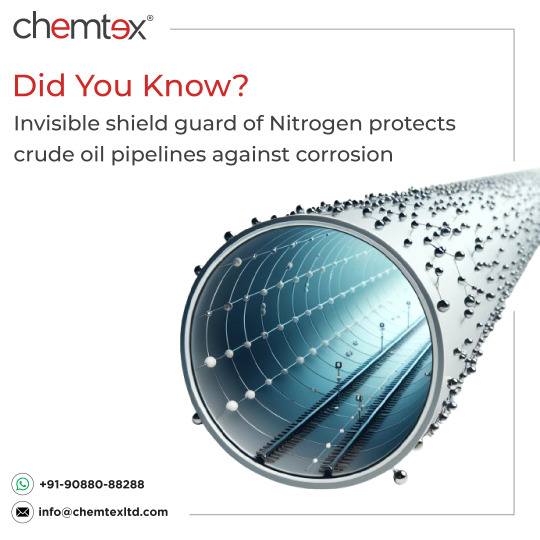
Did you know?
Invisible Shield of Nitrogen protects Crude oil pipelines against corrosion.
#imidazoline#imidazolinesolutions#chemtexchemicals#corrosioninhibitor#oilandgasindustry#industrialchemistry#petroleumproduction#chemtex#corrosion#chemicalmanufacturing
0 notes
Text
Explore the Chemistry of Acid Corrosion Inhibitors | Offered by Chemtex Speciality Limited
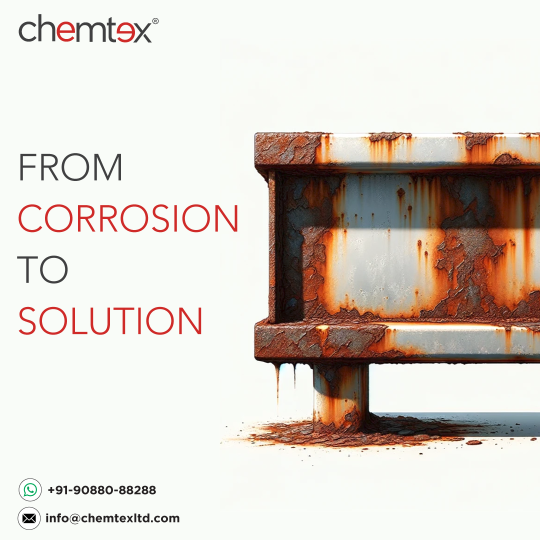
Chemtex Speciality Limited, a renowned chemical solution provider, has developed a wide range of acid corrosion inhibitors to combat corrosion, enhance operational efficiency, and prolong equipment lifespan. Our range offers protection against the relentless forces of corrosion. Through their intricate chemistry and proven efficacy, these compounds empower industrial facilities to fortify their defenses, ensuring the longevity, reliability, and safety of critical assets.
#corrosioninhibitor#anticorrosion#metalprotection#rustprevention#industrialcoating#descalingchemicals#descalant#scaleinhibitors#scaleremoval#corrosion#industrialchemical#chemtex
0 notes
Text
How pre-inhibited Propylene Glycol Redefines Industrial cooling in Food& Beverage Industry | Chemtex Speciality Limited

TONO FROST 593 is not just another Coolant- It's a game changer for Food & Beverage industry.
By choosing TONO FROST 593, industry professionals can ensure the highest quality and safety of their products, while also achieving significant cost savings and contributing to a more sustainable future. Discover the difference TONO FROST 593 can make in your industrial cooling and heating systems.
#propyleneglycol#industrialcoolant#food & beverages#corrosioninhibitors#heattransferfluid#antifreeze#glycol#foodgradeglycol#chemtex#chemicalmanufacturer
1 note
·
View note
Text
Why SAP matters? Understanding Its Significance in Ice Gel Packs | Chemtex

In a time when environmental awareness is paramount, SAP shines as a leader in sustainable practices. Its incorporation into a wide range of solutions, such as cutting down on water usage in agriculture and decreasing plastic waste in consumer goods, demonstrates a dedication to eco-conscious initiatives. Through the adoption of SAP-driven advancements, businesses can lessen their ecological footprint and help build a more sustainable tomorrow.
0 notes
Text
How to select the Right Coolant Additives for your Coolant?
Maximize your engine performance, choose chemtex's specially formulated range of Coolant Additives because it is vital to keep your engine running smoothly in any condition.
Chemtex Speciality Limited committed to innovation and excellence guarantees that is coolant additives play a vital role in boosting industrial efficienc,empowering businessess to surpass operational benchmark,s and elevate profitability.

#chemtex#coolantadditives#antifreeze#heattransfer#coolingsystem#heatcontrol#antifreezecoolant#radiatorcooling#chemicalmanufacturer
1 note
·
View note
Text
How to Select the Right Coolant Additives for Your Coolant?
Selecting the right additives for a coolant formulation, tailored to a specific requirement is a complex endeavour, necessitating a thorough understanding of the engine/radiator’s operational needs and careful consideration of various factors.
The global market for coolant antifreeze currently stands at approximately 10.49 billion U.S. dollars, and projections indicate it will soar to 34.02…

View On WordPress
0 notes
Text
How NSF Certified pre-inhibited propylene glycol based TONO FROST 593, sets a new standard in Corrosion Protection in F&B industry?
In the realm of corrosion protection, innovation is the key to safeguarding investments and ensuring longevity. Enter TONO FROST 593, a groundbreaking solution designed to revolutionise corrosion protection with its pre-inhibited propylene glycol formula. This NSF certified marvel isn’t just another product; it’s a game-changer, setting a new gold standard in the industry.
Choosing normal glycol…

View On WordPress
0 notes
Text
What Makes Super Absorbent Polymer Exceptional? | Chemtex Speciality Limited
Dive into the Polymers (SAPs) and uncover how they master the art of water locking, revolutionizing moisture management across industries.

#superabsorbentpolymer#sodiumpolyacrylate#sappolymer#polymermanufacturer#artificialsnow#waterretaining#chemtex#chemicalmanufacturer
0 notes
Text
How the use of acid inhibitors prevents flash rusting during acid cleaning?
One of the crucial aspects of metal infrastructure maintenance is the regular cleaning process. Within this domain, Acid Cleaning emerges as a pivotal method renowned for its efficacy in eradicating rust, scale, and contaminants from metal surfaces across diverse industrial sectors. However, amidst its utility, a notable challenge looms: the occurrence of flash rusting. This phenomenon entails the rapid onset of rust, swiftly spreading across metal surfaces upon exposure to oxygen and moisture. It serves as a significant indicator, suggesting potential salt contamination, heightened humidity levels, or a combination of both factors. In the perpetual endeavour to combat corrosion, the emergence of flash rusting introduces a compelling element to the narrative of metal preservation.
Let us first try to understand what’s and whys of flash rusting. It is a rapid corrosion process that occurs when metal surfaces, stripped of rust and contaminants through acid cleaning, react with oxygen and moisture from the atmosphere. The freshly exposed metal becomes highly susceptible to oxidation, leading to the formation of iron oxide or rust. This type of rusting typically occurs within minutes after cleaning operations are completed. The rate of flash corrosion depends upon the amount of dissolved oxygen in the water, impurities present in the water, the amount of ionic compound on the metal surfaces, and the total drying time.
As we all know corrosion creates various effect that weakens the integrity of the entire infrastructure. It's not just about the visible damage – it's the ripple effect. It leads to losses worth over 900 thousand crores in India Annually.
“As India moves towards a USD 5 trillion economy goal, dealing with a challenge like corrosion in projects should be a key focus area, said Rajamani Krishna Murti, president of Indian Stainless-Steel Development”
Role of Acid Inhibitors
Acid inhibitors are chemicals added to acidic solutions during the cleaning process to prevent flash rusting. These inhibitors also prevent corrosive reactions of acids with metal surfaces, extending longevity and reducing operational costs. By forming a protective layer, they shield the metal from direct contact with acids, inhibiting corrosion and enhancing durability. They combat corrosion, control its impact, improve resistance, prevent rust, and provide essential surface treatment.
Working Mechanism
Passivation: These inhibitors create a passivation layer, which act as a barrier, reducing the reactivity of the metal with free acid ions.
Chemical Reaction Inhibition: These complexes effectively block active sites on the metal, reducing the rate of oxidation.
Film Formation: Some form a thin film over the metal surface, creating a physical barrier that shields the metal from acid elements. This film helps prevent the initiation of corrosion reactions, thus minimizing the risk of flash rusting.
Variants
Different types of acids require specialized inhibitors for effective metal protection during cleaning processes:
Inhibitor for hydrochloric acid: Forms protective films to shield metal from corrosion during acid cleaning, ensuring durability in corrosive environments.
Inhibitor for sulfuric acid: Reduces corrosion rates and extends equipment lifespan in corrosive environments by forming protective films on metals during acid etching.
Organic Inhibitors: Compounds like amines, phosphates, and organic acids adsorb onto metal surfaces, forming protective films that inhibit corrosion during acid cleaning.
Inhibitors for sulfamic acid: Comprising diethyl thiourea, stabilizers, and surfactants, these inhibitors act as semi-foaming acidic corrosion inhibitors, ideal for pre-formulated descaling. Effective on various metal surfaces including Copper, Brass, Nickel, Tin, Lead, Zinc, galvanized surfaces, and all steel types.
In essence, specialized formulations tailored to each acid type are essential for effective corrosion prevention during cleaning processes. With Chemtex Speciality Limited's expertise and innovative solutions, the battle against corrosion takes a significant step forward, ensuring a brighter and more durable future for metal-dependent industries.
Visit for more information: https://www.chemtexltd.com/products-and-solutions/performance-chemicals/corrosion-inhibitor/acid-corrosion-inhibitor/
0 notes
Text
How the use of acid inhibitors prevents flash rusting during acid cleaning?
One of the crucial aspects of metal infrastructure maintenance is the regular cleaning process. Within this domain, Acid Cleaning emerges as a pivotal method renowned for its efficacy in eradicating rust, scale, and contaminants from metal surfaces across diverse industrial sectors. However, amidst its utility, a notable challenge looms: the occurrence of flash rusting. This phenomenon entails…
View On WordPress
0 notes
Text
Inhibited propylene Glycol Manufacturer | Chemtex Speciality Limited
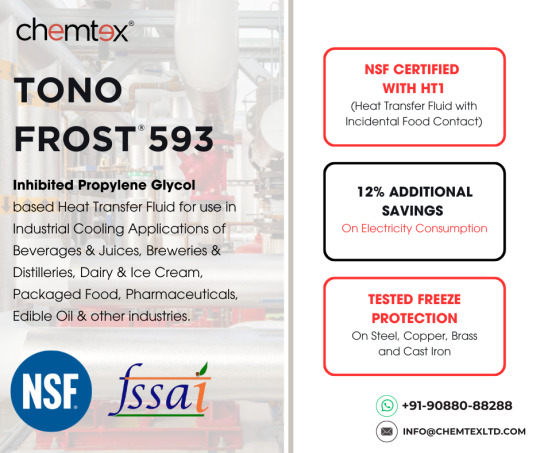
Discover why food grade glycol is essential for precision temperature control and product integrity in F&B operations.
#chemtex#chemicals#propyleneglycol#glycol#foodgradeglycol#temperaturecontrol#chemicalindustry#chemicalmanufacturer
1 note
·
View note
Text
What Makes Food Grade Glycol Indispensable in F&B Operations?
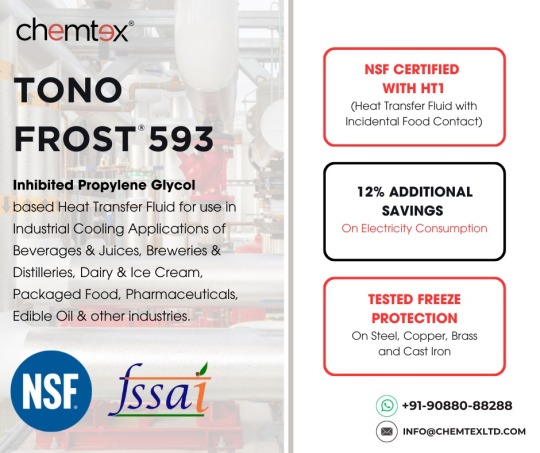
View On WordPress
0 notes
Text
What Makes Food Grade Glycol Indispensable in F&B Operations?
In the dynamic landscape of F&B operations, that includes Beverages and juices, Breweries & Distilleries, Dairy & Ice Cream production, Packaged Food processing, Fish Processing Units, Pharmaceutical & Bulk Drugs manufacturing, Poultry facilities, and Vegetable Oil processing, innovations and efficiency are the keys to success. Among all essential components, one essential component that plays a crucial role in maintaining these standards is food grade glycol. Generally, Propylene glycol (PG) is generally considered and used as one. Recognized as safe by regulatory bodies like the FDA, it works as a heat transfer fluid (HTFs), widely used in diverse industries. Its high thermal conductivity, low viscosity, and non-toxic nature make it ideal for applications where heat transfer efficiency and safety are paramount.
Propylene Glycol ensures precise temperature control during chilling, ensuring optimum thermal stability at extreme temperatures. Its broad-spectrum compatibility with various materials, makes it a preferred choice for food-grade heat transfer systems. It stands as a reliable and efficient solution, ensuring both operational excellence and adherence to stringent health standards in food manufacturing processes.
How Propylene Glycol play an important role in the food and beverage industry?
In F&B industry, it's crucial to use HTFs that meet specific requirements for safety, performance, and regulatory compliance. This glycol is
Temperature Control in Processing, such as brewing, winemaking, and food processing, where controlling fermentation temperatures or chilling beverages, glycol systems offer precise control, ensuring optimal conditions for product quality and safety.
Adherence to Stringent Food Safety Regulations is non-negotiable in the F&B industry.
Heat Transfer Efficiency, due toits high thermal conductivity and low viscosity, facilitates rapid heat transfer across equipment and pipelines. This ensures uniform heating and cooling, improving process efficiency while maintaining product integrity and quality.
Frost and Ice Prevention, by lowering the freezing point of water-based solutions. This anti-freeze property ensures uninterrupted operations and prevents damage to equipment and infrastructure.
Versatility and Compatibility, with a wide range of materials commonly used in F&B equipment and infrastructure.
Only issue with this glycol is its corrosive nature! Over a period of time, it oxidizes into five organic acids, which chemically attack and corrodes the system metal, causing pitting, pinhole and stress cracking corrosion. Is there a solution?

Inhibited Propylene Glycol! What is it? It is a blend of glycol with an inhibitor package that ensures no oxidation of glycol over a considerable period of time. Its utilization spans various critical processes including immersion freezing, cooling liquids & and dairy products, fermentation and maturation cooling, carbonated beverage cooling, plastic bottle molding cooling, ice systems, single-fluid process cooling, and closed-loop water-based heating, ventilation, and air conditioning (HVAC) applications. Its enhanced viscosity at lower temperatures, drives process cooling efficiency, as well as its freezing point suitable for aqueous solution applications. Importantly, it is non-toxic, ensuring compliance with stringent safety standards in F&B operations.
Inhibited Propylene Glycol, manufactured by Chemtex Speciality Limited under the brand name “TONO FROST” is a NSF certified HT1 formulation, that is considered safe even in instances of incidental food contact. Moreover, it is listed with FSSAI under Food Product Category 99 for Substances added to Food, further affirming its safety for use in food-related applications. By embracing glycol-based solutions, F&B professionals can navigate the complexities of their operations with confidence, ultimately delivering superior products to consumers worldwide.
For more information, visit https://www.chemtexltd.com/products-and-solutions/heat-transfer-fluid-manufacturer-chemtex-speciality-limited/glycol-antifreeze/inhibited-propylene-glycol/
0 notes
Text
What Makes Food Grade Glycol Indispensable in F&B Operations?
In the dynamic landscape of F&B operations, that includes Beverages and juices, Breweries & Distilleries, Dairy & Ice Cream production, Packaged Food processing, Fish Processing Units, Pharmaceutical & Bulk Drugs manufacturing, Poultry facilities, and Vegetable Oil processing, innovations and efficiency are the keys to success. Among all essential components, one essential component that plays a…
View On WordPress
0 notes